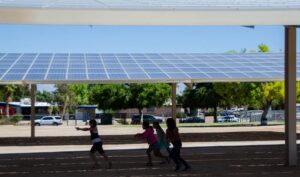Energy Department announces $366 million for rural clean energy projects
The U.S. Department of Energy is investing $366 million to support clean energy development in rural and remote areas, officials announced Tuesday.
The money will support 17 projects across 20 states and 30 Native American tribal nations.
“President [Joe] Biden firmly believes that every community should benefit from the nation’s historic transition to a clean energy future, especially those in rural and remote areas,” Energy Secretary Jennifer Granholm said in a press release. “DOE is helping revitalize communities across America — ensuring thriving businesses, reliable access to clean energy, and exciting new economic opportunities, now and for generations to come.”
Twelve of the projects are fully on tribal land. One project, which is receiving $10 million, will use solar power to reduce costs for Taos Pueblo households by $700 per year.
Another initiative, led by Native Renewables Inc., will receive $8 million to install solar and battery energy storage systems to provide electricity for 300 homes in the Navajo and Hopi nations. In a 2022 report the Energy Department found that 21% of Navajo and 35% of Hopi tribal homes do not have electricity.
“Many tribal communities, tribal nations generally pay higher than average rates for electricity,” Wahleah Johns, head of the Energy Department’s Office of Indian Energy, told reporters Monday. “They face a high energy burden and energy poverty.”
One project to receive a large payout is the National Association of Community Health Centers, which was awarded more than $57 million. The organization will provide clean energy systems to 175 rural health centers across the Southeast in Alabama, Florida, Georgia, Kentucky, Mississippi, North Carolina, South Carolina and Tennessee.
The National Rural Electric Cooperative Association received $45.2 million to create rural electric cooperatives and deploy solar infrastructure in seven rural areas across the country: Anza, California; Arivaca, Arizona; Clinton and Cooke City, Montana; Decatur, Tennessee; Cherry Lane, North Carolina; and the Shakopee Mdewakanton Sioux community in Minnesota.
The U.S. Department of Energy is investing $366 million to support clean energy development in rural and remote areas, officials announced Tuesday.
The money will support 17 projects across 20 states and 30 Native American tribal nations.
“President [Joe] Biden firmly believes that every community should benefit from the nation’s historic transition to a clean energy future, especially those in rural and remote areas,” Energy Secretary Jennifer Granholm said in a press release. “DOE is helping revitalize communities across America — ensuring thriving businesses, reliable access to clean energy, and exciting new economic opportunities, now and for generations to come.”
Twelve of the projects are fully on tribal land. One project, which is receiving $10 million, will use solar power to reduce costs for Taos Pueblo households by $700 per year.
Another initiative, led by Native Renewables Inc., will receive $8 million to install solar and battery energy storage systems to provide electricity for 300 homes in the Navajo and Hopi nations. In a 2022 report the Energy Department found that 21% of Navajo and 35% of Hopi tribal homes do not have electricity.
“Many tribal communities, tribal nations generally pay higher than average rates for electricity,” Wahleah Johns, head of the Energy Department’s Office of Indian Energy, told reporters Monday. “They face a high energy burden and energy poverty.”
One project to receive a large payout is the National Association of Community Health Centers, which was awarded more than $57 million. The organization will provide clean energy systems to 175 rural health centers across the Southeast in Alabama, Florida, Georgia, Kentucky, Mississippi, North Carolina, South Carolina and Tennessee.
The National Rural Electric Cooperative Association received $45.2 million to create rural electric cooperatives and deploy solar infrastructure in seven rural areas across the country: Anza, California; Arivaca, Arizona; Clinton and Cooke City, Montana; Decatur, Tennessee; Cherry Lane, North Carolina; and the Shakopee Mdewakanton Sioux community in Minnesota.
“Americans in every pocket of the country can reap the benefits of clean energy,” Granholm told reporters on Monday.
The money comes from the bipartisan infrastructure law. Tuesday’s announcement means federal officials will start negotiations with the project leaders before funding is issued.
“What’s special is how these projects showcase rural and remote communities’ innovative approaches to clean energy deployment,” Granholm said. “Every one of these projects is extremely unique and very specific.”

